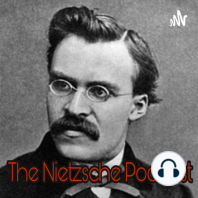1 min listen
44: Cartesian Dualism
ratings:
Length:
63 minutes
Released:
Jun 28, 2022
Format:
Podcast episode
Description
In this episode, I'm reading a chapter of my book, Unconscious Correspondences. I considered an episode on Cartesian Dualism, but realized I'd already said everything I needed to say, in a chapter in this book. Rather than repurposing the same content into a new form, why not just read directly from the book? As Nietzsche tended to do when introducing his own earlier works, I shall do the same. I will introduce this essay: "Body and Mind: The Life and Meditations of Rene Descartes - A Polemic" with, "An attempt at self-criticism".
This essay has its flaws, and belabors the point a bit too stringently at places. In retrospect, I made some very overgeneralized claims about academia and modern attitudes towards Descartes that one could easily challenge. I should also say that these claims derived from personal experience with my own professors, and the professors of many of my friends. Descartes was always taught as being "basically a secret atheist who didn't believe the religious stuff at all and included it just to please the church." Not only did one of my own professors say some version of this, I heard this from others, attending different universities. This always struck me as odd, because the central premises of his Meditations on First Philosophy are completely derived from Christian presuppositions, which are simply taken from theology and put into philosophical language. Thus, I challenged: whether Descartes was truly a departure from past philosophy (Plato, of course, sets up figures to raise assertions and Socrates to raise skeptical objections/doubts); whether Descartes was actually an atheist or a deist (or whether we could understand him within the assumption he was a Christian, perhaps a Rosicrucian); whether our own interpretations of Descartes have to do with our embrace of the "mind as self" ego-consciousness (thus leading us to be confused and embarrassed by Descartes' invocation of God as the ultimate certainty). While I wrote in a way that was somewhat clumsy in my eyes now, and while I may have spent too much time in a detour talking about the background historical context in which Descartes emerged, I feel these challenges are raised in a forceful and meaningful enough way to be useful for people to think about. https://app.thebookpatch.com/BookStore/unconscious-correspondences/3fe82dc3-d4ac-4d61-81c3-9ce9a7abe483
This essay has its flaws, and belabors the point a bit too stringently at places. In retrospect, I made some very overgeneralized claims about academia and modern attitudes towards Descartes that one could easily challenge. I should also say that these claims derived from personal experience with my own professors, and the professors of many of my friends. Descartes was always taught as being "basically a secret atheist who didn't believe the religious stuff at all and included it just to please the church." Not only did one of my own professors say some version of this, I heard this from others, attending different universities. This always struck me as odd, because the central premises of his Meditations on First Philosophy are completely derived from Christian presuppositions, which are simply taken from theology and put into philosophical language. Thus, I challenged: whether Descartes was truly a departure from past philosophy (Plato, of course, sets up figures to raise assertions and Socrates to raise skeptical objections/doubts); whether Descartes was actually an atheist or a deist (or whether we could understand him within the assumption he was a Christian, perhaps a Rosicrucian); whether our own interpretations of Descartes have to do with our embrace of the "mind as self" ego-consciousness (thus leading us to be confused and embarrassed by Descartes' invocation of God as the ultimate certainty). While I wrote in a way that was somewhat clumsy in my eyes now, and while I may have spent too much time in a detour talking about the background historical context in which Descartes emerged, I feel these challenges are raised in a forceful and meaningful enough way to be useful for people to think about. https://app.thebookpatch.com/BookStore/unconscious-correspondences/3fe82dc3-d4ac-4d61-81c3-9ce9a7abe483
Released:
Jun 28, 2022
Format:
Podcast episode
Titles in the series (100)
The Nietzsche Podcast Trailer by The Nietzsche Podcast
